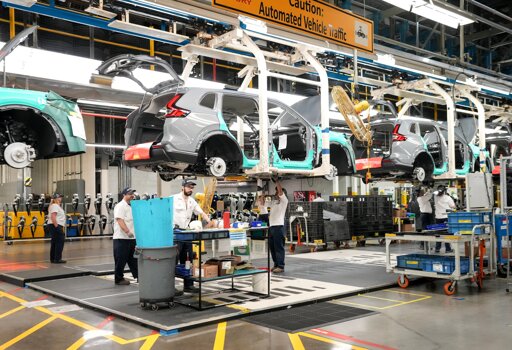Bold mine.
Since 2021, global auto giants including Volkswagen, General Motors, Ford and Honda — and battery-makers from South Korea to Sweden — have pledged $46.1 billion in investments, mostly in Ontario and Quebec. Canadian taxpayers have kicked in $52.5 billion through subsidies, tax credits and other funding from federal and provincial coffers.
Nevertheless, the wheels have begun to wobble enough in recent months to fuel doubts about how realistic Canada’s EV ambitions are.
Several automakers have postponed or shelved projects as consumers fret over battery range and gaps in charging networks for still-pricey electric vehicles. Battery producers facing lower prices and margins have scaled back, too.
At stake are thousands of new EV manufacturing and battery jobs, opportunities for scores of small and medium-sized suppliers, and Canada’s aim to be the critical minerals supplier to the world. A slow-down in the shift to electric cars, buses and trucks would also jeopardize plans to clean up the transportation sector, the country’s second-largest greenhouse gas emitter.



Given the enormous stakes of our transition away from fossil fuels, I think we need more data - prepared independent of Western commercial interests - to conclude that tariffs (on Chinese EVs - I assume that’s what you’re referring to) aren’t counter-productive. I do not trust Western automakers to prepare those data, and I would gladly to purchase an economical Chinese EV without any exorbitant tariffs myself. Otherwise, I’d buy an old ICE car. It’s well documented how egregiously privacy-violating modern US-made cars are; no @#$%ing way would I buy one for $60k. I suspect we’ll see a lot of NA automakers taking these EV funds from the Canadian government and deliver little in return. I’m not buying a flimsy Chinese boogeyman argument to prop them up and take them off the hook from innovating. China’s leading the way in several sustainable energy endeavours as I understand it. Sure, there are a lot of problems with the country (like many other countries). I wish we’d focus on competing with them on sustainable energy efforts versus use protectionist policies that favour local corporations but disadvantage local consumers and slow down the divestment away from fossil fuels
Per capita china release less carbon than Canada. People love to say why bother changing here when china is pumping out tons of carbon.
Realistically, one of the best things we can do to phase out fossil fuels in transportation is build transit and promote active ways of traveling like cycling and walking. Unfortunately, places like Ontario are making it increasingly difficult to build better places.
Totally agree on transit, unfortunately good transit will take time. EVs are a good stop gap solution that uses existing car-centric urban design.
I think e-bikes are a better stop gap. They can scrap a lot of car trips entirely, sand the same batteries for one electric car can power 20+ e-bikes.
Of course, for the majority of Canada, an e-bike is (like bicycles and motorcycles) only safely usable about 7 months of the year. If you need a car for the other 5 months, it doesn’t always make sense to have an e-bike as well.
Proper biking infrastructure could let bicycles an e-bicycles work year round. Some scandinavian countries have busy bike lanes year round and they get plenty of snow.
And I just moved from a province in Canada where the provincial government has to law forcing municipalities to remove bike Lanes, and disallowing people from suing the government for any death or injury caused by a removed bike lane.
It’s not getting better.
I live on Vancouver Island so I probably could ride an ebike 11-12 months a year, but I also live in a small town and work significantly further away than ebike range. So the only trips I could replace my car with an ebike would be in town, less than 10km round trip which is less than 1L of gas for even inefficient cars. Even if I went on one of those small rides every day off, best case scenario I’d save $350/yr. That would take a long time to pay off an ebike, not to mention the trailer I’d have to have for my kid and/or groceries to actually effectively replace a car trip.
And continues suburban sprawl and promotes the housing crisis. Our ruined citites and the social and economic state of this country are interconnected. The longer we wait, the harder it gets to fix.
Current governments (in Canada; e.g., Federal, Alberta, Ontario) seem very focused on protecting the current fossil fuel oligarchs and their profits and very underfocused on the green economy transition, sustainability, affordability, livability
The only things I’d say in response to this is: there is good evidence that China’s EVs are subsidized, meaning it would not put our manufacturers on a level playing field without tariffs; and if you believe Chinese EVs aren’t going to be as laden with spyware as their smartphones or their 5G technology, then I’m not sure what to say.
Your concerns are legitimate, but I don’t think this is the correct solution.